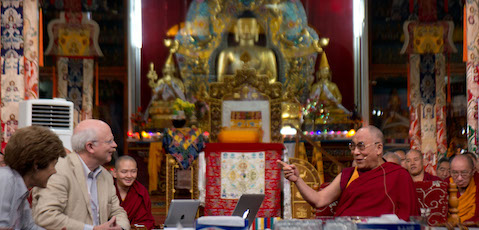Filmed during Mind & Life Institute’s “Mind & Life XXVI: Mind, Brain and Matter” on January 20, 2013.
Day Four: Consciousness
Consciousness in Western Science and Philosophy
SPEAKERS: His Holiness the Dalai Lama, Christof Koch, PhD, Matthieu Ricard, PhD
The topic of consciousness is one that humans have wrestled with for centuries. How is consciousness related to material substrates, such as the brain and body? Christof Koch argued that the interactions of neuronal and sub-neuronal processes give rise not only to animal and human behavior but also to conscious experience. He discussed information theory, which assumes that any physical system that is sufficiently rich in information will have conscious experiences, and the content of those experiences depends on the exact nature of the causal interactions of the underlying components (e.g., neurons). Such theories can be empirically tested in animals, healthy people and brain-injured patients. Matthieu Ricard offered a Buddhist perspective, exploring consciousness as a primary phenomenon linked to matter, but also examining evidence that consciousness may not be contingent on matter. He also described how Buddhism transcends dualist views by suggesting that both material and non-material entities are devoid of intrinsic reality.
MODERATOR: Arthur Zajonc, PhD
INTERPRETER: Thupten Jinpa, PhD
Approaches to Consciousness
SPEAKERS: Christof Koch, PhD, Rajesh Kasturirangan, PhD, Michel Bitbol, PhD, and Matthieu Ricard, PhD
Consciousness can be studied from many positions within both science and philosophy. This explored research on consciousness in the brain, theoretical models of consciousness in cognitive science, as well as neurophenomenological investigations and Buddhist views on consciousness. Christof Koch introduced a brain-focused approach to consciousness, and outlined the differences between states of consciousness (awake, deep sleep, coma), what we know about the neural basis of consciousness in human and non-human animals, and how these are studied in the laboratory and the clinic. Rajesh Kasturirangan discussed a theoretical cognitive model of consciousness by introducing the “self as organizer” presupposition as a bridging framework between the various Indian philosophical traditions and the mind-brain sciences. Michel Bitbol discussed consciousness from a phenomenological standpoint, challenging the view that conscious experience derives from a material basis. Finally, Matthieu Ricard argued that it is not logically reasonable for consciousness to arise from nothing; rather, causality dictates that consciousness must arise from consciousness itself.
MODERATOR: Arthur Zajonc, PhD
PARTICIPANTS:
Khen Rinpoche Jangchup Choeden
Richard Davidson
Sona Dimidjian
James R. Doty
John Durant
Anne Harrington
Wendy Hasenkamp
Thupten Jinpa
Bryce Johnson
Geshe Lhakdor
Geshe Dadul Namgyal
Lobsang Tenzin Negi
Vijayalakshmi Ravindranath
Geshe Ngawang Samten
Tania Singer
Aaron Stern
Diana Chapman Walsh
Carol Worthman
Participants
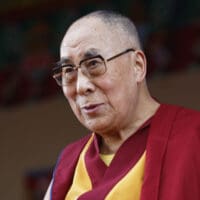
His Holiness the 14th Dalai Lama
Honorary Board Chair
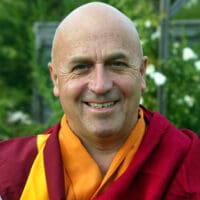
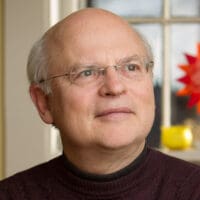
Arthur Zajonc, PhD
Mind & Life Institute
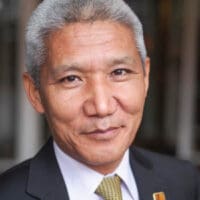

Rajesh Kasturirangan
Reviewer
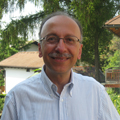
Michel Bitbol, MD, PhD
Archives Husserl, École Normale Supérieure

